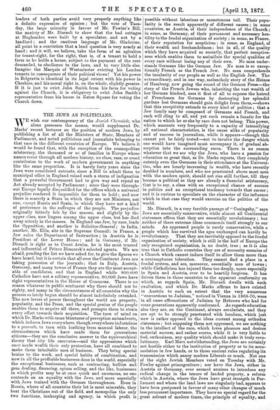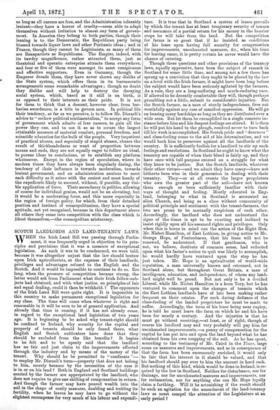THE JEWS AS POLITICIANS.
WE wish our contemporary of the Jewish Chronicle, who alone possesses the means, would supplement Dr. Marks' recent lectures on the position of modern Jews, by publishing a list of all the Ministers of State, Members of
Parliament, and noted politicians and journalists belonging to that race in the different countries of Europe. We believe it would be found that, with the exception of the cosmopolitan
aristocracy, the thousand or so of families in Europe whose names recur through all modern history, no class, race, or creed contributes to the work of modern government in anything like the same proportion. It is barely forty years since the Jews were considered outcasts, since a Bill to admit them to municipal office in England raised such a storm of indignation that a powerful Government had to give way and repeal an Act already accepted by Parliament ; since they were through- out Europe legally disqualified for the offices which a universal prejudice rendered it impossible for them to hold ; and now there is scarcely a State in which they are not Ministers, not one, except Russia and Spain, in which they have not a kind of preference in the suffrages of the people. The prejudice originally bitterly felt by the masses, and slightly by the upper class, now lingers among the upper class, but has died away utterly in the masses. In England one Jew, by race, leads the Opposition, and another is Solicitor-General ; in India, another, Mr. Ellis, sits in the Supreme Council; in France, a Jew rules the Department of Instruction ; in Austria he is President of the Lower House ; and in Germany, if Mr. Disraeli is right as to Count Arnim, he is the most trusted and influential of Prince Bismarck's selected agents. We are afraid, pending the list we have asked for, to give the figures we have heard, but it is certain that all over the Continent Jews are taking possession of the journals ; that in Italy, Austria, Germany, and many towns of France they are the most accept- able of candidates, and that in England while 800.000 Catholics have not a solitary representative, 80,000 Jews have eight representatives in the House of Commons. There is no reason whatever in public sentiment why there should not be eighty, and many in the circumstances of all countries why the process so lately begun should be almost indefinitely extended. The new levers of power throughout the world are property, popularity, and the Press, and the special genius of the people enables them to acquire all three, and prompts them to strain emery effort towards their acquisition. The turn of mind on which Dr. Marks with some bluntness of perception animadverts, which induces Jews everywhere, though everywhere industrious to a proverb, to turn with loathing from manual labour, the circumstances which have made them for generations citizens—they are the conclusive answer to the squirearchical theory that city life enervates—and the oppressions which once made wealth their only protection, have all combined to make them inimitable men of business. They bring special brains to the work, and special habits of combination, and now in all the profitable businesses done in the world, especially the exceptional businesses, such as contracting, bullion and gem dealing, financing, opium selling, and the like, businesses in which profits may be at once quick and enormous, no one contends on an equality with the Jews, and more especially with Jews trained with the German thoroughness. Even in Russia, where of all countries their lot is most miserable, they beat the Christians out of the field, and monopolise the only two functions, innkeeping and agency, in which profit is
possible without laborious or monotonous toil. Their popu- larity is the result apparently of different causes ; in some countries, as Austria, of their independence of the Church ; in some, as Germany, of their permanent and necessary hos- tility to the feudal organization of society ; in some, as France, of their reputation for scepticism ; in some, as England, of their wealth and freehandedness ; but in all, of the quality which they have acquired so recently, that perfect receptive- ness which enables them to assimilate the special qualities of every race without losing any of their own. No man under- stands Germans like the German Jew. No man is so excep- tionally French as the French Jew. No man comprehends the insularity of our people so well as the English Jew. The extraordinary, and in one way, melancholy story of the Heines of Hamburg, now going the round of the German Press—the story of the French Jewess who, inheriting the vast wealth of her German kindred, uses it first of all to express the hatred of Frenchmen for Germans by destroying her splendid gardens lest Germans should gain delight from them,—shows that this receptivity extends to every kind of politics ; that a Jew family may be composed of Germans and French, and each will cling to all, and yet each remain a fanatic for the nation to which he or she by race does not belong. This power, which amounts very frequently to a capacity of intensifying all national characteristics, is the cause alike of popularity and of success in journalism, while it appears—though this cannot yet be fairly tested—not to involve the danger which one would have imagined must accompany it, of gradual ab- sorption into the surrounding races. There is no reason whatever that we see why the Jews, who have a passion for education so great that, as Dr. Marks reports, they completely outstrip even the Germans in their attendance at the Universi- ties, who are hourly increasing in wealth, who have recently doubled in numbers, and who are penetrated above most men with the modern spirit, should not rise still further, till they become a political as they are already a financial aristocracy, that is to say, a class with an exceptional chance of success in politics and an exceptional tendency towards that career ; and it is curious to speculate on the character of the influence which in that case they would exercise on the politics of the world.
Mr. Disraeli, in a very forcible passage of " Coningsby," says Jews are essentially conservative, while almost all Continental statesmen affirm that they are essentially revolutionary ; but neither of these extreme ideas commends itself strongly to our minds. An oppressed people is rarely conservative, while a people which has survived the ages unchanged can hardly be revolutionary. That they are inevitably opposed to the feudal organisation of society, which is still in the half of Europe the only recognised organisation, is, no doubt, true ; as it is also true that in Catholic countries they are of necessity enemies of a Church which cannot induce itself to allow them more than a contemptuous toleration. They cannot find a place in a feudal system, and are, moreover, essentially men of towns ; while Catholicism has injured them too deeply, more especially in Spain and Austria, ever to be heartily forgiven. It has driven them in those countries to the apparent conformity on which, as regards Spain, Mr. Disraeli dwells with such exultation, and which Dr. Marks affirms to have existed in Austria to such an extent that the very numerous "conversions to Judaism," noticed in Vienna in 1868-70, were in all cases affirmations of Judaism by Hebrews who had for some generations apparently conformed. As regards education
also they are, on the Continent, always secularists, and they are apt to be strongly penetrated with localism, which just
now is rather opposed to the ideas current among orthodox statesmen ; but supposing them not oppressed, we see nothing in the intellect of the race, which loves pleasure and desires material success, and rather scorns, while it is very liable to feel, enthusiasm, any quality which should make it truly revo- lutionary. Karl Marx notwithstanding, the Jews are certainly not hostile either to the institution of property or to its accu- mulation in few hands, or to those ancient rules regulating its transmission which annoy modern Liberals so much. Not one of the eight Jewish Members voted on Tuesday with Mr.
Fowler against primogeniture; nor have the Jews, either in Austria or Germany, ever seemed anxious to introduce any radical change in the tenure of landed property, a reform which in Austria, where the Jews have great strength in Par- liament and where the land laws are singularly bad, appears to have been postponed in favour of many other changes of much less permanent importance. They have no special regard for the great solvent of modern times,. the principle of equality, and so long as all careers are free, and the Administration tolerably , lenient—they have a horror of cruelty—seem able to adapt themselves without irritation to almost any form of govern- ment. In America they belong to both parties, though their leaning is to the Democratic, the Republican party being biassed towards liquor laws and other Puritanic ideas ; and in France, though they cannot be Legitimists, as many of them are Bonapartists as Republicans. The Empire, indeed, with its tawdry magnificence, rather attracted them, just as theatrical and operatic enterprise attracts them everywhere, and four or five of them were amongst its most conspicuous and effective supporters. Even in Germany, though the Emperor dreads them, they have never shown any dislike of • the State system, which offers them in its bureaucratic arrangements some remarkable advantages ; though no doubt they dislike and will help to destroy the decaying social system, which, based as it still is on birth, is
as opposed to their interests as their pride. It is not for them to think that a descent, however clear, from bar- barian swordsmen, is a title to govern men. In political life their tendency, as far as we perceive, is to follow Mr. Disraeli's advice to "eschew political sentimentalism," to accept any form -of government which admits of free careers, to gain all the power they can, and to use it so as to secure the largest attainable measure of material comfort, personal freedom, and scientific education for the bulk of the people. Very impatient of practical abuses, and especially of stupid abuses, abases the result of thickheadedness or want of proportion between means and ends, they are not equally eager to follow an ideal, to pursue ideas to conclusions, or to establish any platform whatsoever. Except in the region of speculation, where in modern times they have always been singularly daring, the tendency of their influence is towards moderation, towards lenient government, and an administration anxious to meet each difficulty as it arises with the easiest and most handy of the expedients likely to succeed, without, if possible, any visi- ble application of force. Their ascendancy in politics, allowing of course for individual genius, would not be an elevating, but
it would be a moderating force, and this more especially in the region of foreign policy, for which, from their detached position and instinct of cosmopolitanism, they have a special aptitude, not yet recognised, because in this department above all others they come into competition with the class which is llkest themselves,—the cosmopolitan aristocracy.



































 Previous page
Previous page